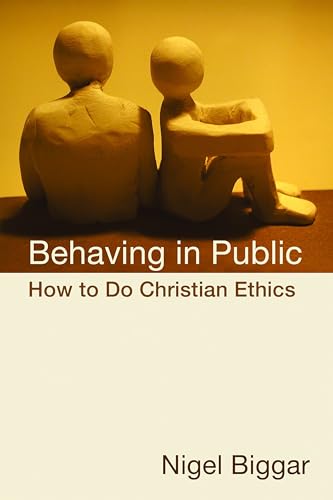Behaving in Public: How to Do Christian Ethics
Written by Nigel Biggar Reviewed By David W. JonesNigel Biggar is Regius Professor of Moral and Pastoral Theology at the University of Oxford (UK), where he also directs the McDonald Centre for Theology, Ethics, and Public Life. Given his position, one would expect him to be well qualified to write a text entitled Behaving in Public: How to Do Christian Ethics.
The purpose of this short book, writes Biggar, is to enable believers “to speak in the world at once with Christian integrity and with practical wisdom” (p. xvi). Biggar begins his text by explaining the failure of both conservative and liberal versions of Christianity to engage the culture meaningfully and to produce life-change. Biggar notes that conservatives are theologically rich, but are hesitant to take part in the public square, while liberals willfully engage the culture yet are biblically and theologically thin. In view of these failures to reach the culture, Biggar crafts and unfolds a third and novel way of behaving in public. In short, Biggar's highly nuanced solution for Christian cultural engagement is for believers to set aside their distinctiveness (while maintaining their theological integrity), humbly enter the public square, consciously try not to impose their perspective on others, and do ethics by appealing to natural law and a common sense of morality that is shared by Christians and non-Christians alike. Scripture plays a supplementary and reinforcing role within this paradigm. Biggar notes that in order to reach the culture, the believer must “play pastor before he plays prophet” (p. 112).
There are many aspects of Behaving in Public for which Biggar can be commended. For instance, Biggar's identification of this topic as a needed subject for the church is praiseworthy. Surely the title of this book will catch the eyes of many. Biggar's description of the failings of both conservative and liberal theologies to engage the culture meaningfully is accurate. Additionally, the breadth of individuals with whom Biggar engages and to whom he appeals in this book is admirable. Over the course of the book's five chapters, Biggar dialogues with historical figures such as Aquinas, Luther, and Calvin, as well as modern ethicists such as Barth, Ramsey, and Rawls, among many others. Biggar cannot be chargedwith developing his ideas in isolation. Moreover, the publisher can be commended for the extensive bibliography and comprehensive index that are appended to this volume.
The above accolades notwithstanding, there are several drawbacks to Behaving in Public of which the prospective reader ought to be aware. A major issue for some readers may be Biggar's own theological views that inevitably find their way into his text and surely shape his ideas. For example, while he repeatedly identifies himself as theologically orthodox (p. 14), Biggar discloses his belief that “we are saved by grace through faith and works, and not by grace through faith alone” (p. 88, emphasis original). Additionally, among many other doctrines, Biggar registers his approval of at least some homosexual practice, his belief in a quasi-personal God, and his disapproval of democracy (p. 88). Moreover, Biggar's admittedly liberal theology and view of Scripture influences his ethical methodology. For example, Biggar writes, “A Christian ethic must allow the moral significance of Jesus to shape it directly—but only at the appropriate points. . . . Theology does not touch directly on every important point of a moral argument” (pp. 5, 10). Some readers will find Biggar's views and methods problematic.
Additionally, Biggar's solution to Christian public engagement rests upon some questionable assumptions. For example, the common moral ground that Biggar expects Christians will find with non-believers is debatable. While natural law is a valid concept, and there surely is a moral common-sense that all human beings feel, there is a big difference between the existence of natural law, one's awareness of natural law, and one's ability to keep natural law. If, as Paul indicates in Rom 1-2, mankind has rejected the moral ought-ness that he feels, then this can hardly be common ground from which believers and unbelievers can do ethics. Indeed, years ago Van Til noted that the common consciousness of man is not nearly so common as its name would seem to indicate. So while Biggar considers himself orthodox, his view of the fallen state of man is less than what evangelicals have traditionally held. As such, some of the foundations of Biggar's ideas may be suspect.
The above critiques notwithstanding, Behaving in Public is a stimulating book and will prove useful to those interested in the field of Christian ethics. I recommend this text to those interested in Christian engagement in the public square. While those outside of Biggar's theological tradition will likely not agree with his proposal, this text can spark healthy debate and discussion among individuals seeking to address the issues that Biggar raises.
David W. Jones
David W. Jones
Southeastern Baptist Theological Seminary
Wake Forest, North Carolina, USA
Other Articles in this Issue
Evaluating a new English translation of the Bible can be extremely difficult...
In the November 2009 edition of Themelios, Dane C...
Jonathan Edwards (1703-1758) is remembered today as a saint, scholar, preacher, pastor, metaphysician, revival leader, theologian, Calvinist—the list goes on...
Almost two decades ago I wrote an essay titled " When Is Spirituality Spiritual? Reflections on Some Problems of Definition ...
He was the youngest son of elderly parents. His childhood was secluded and unhappy, which might in some measure account for his lifelong melancholy...






